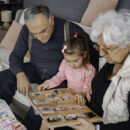Sleep – an introduction

By the time you’re 85, you’ve spent almost 250,000 hours sleeping. Or at least trying to.
If you’re experiencing even moderate stress, restful sleep is often the first casualty. Remember that rumination story? You spend restless nights looking at the clock, wanting desperately to sleep. But instead, the worry-gods rudely beat their midnight drums of doom into your head. You find yourself rounding up every concern you can think of and inviting them in for nightly keep-me-awake ceremonies.
That’s not healthy. Sleep can actually affect how long you live.
Sleep deprivation doesn’t have to be permanent, happily. Researchers over the years have identified many important factors that go into getting a good night’s rest. Even when stressed. They’ve hardened their findings into evidence-based suggestions about what to do, creating the practice of “sleep hygiene”. One series of famous how-to’s come from the late Dr. Peter Hauri, a researcher who did most of his work at the University of Minnesota.
He’s most famous for saying that good sleep hygiene begins not in the hour you go to bed, but in the mid-afternoon, when you’re wide awake. There should be no coffee 6 hours before bedtime. And no alcohol either (that may sound harsh, but the nightcap martini was not designed by sleep researchers). The same embargo goes for cigarettes, for those of you who smoke. Nicotine has stimulant properties.
The time in which you do your physical exercise also turns out to be important. Better to do your workouts earlier in the day, rather than later in the evening.
Dr. Peter Hauri has four other suggestions:
#1) Pay attention to your bedroom
Or whatever room where most of your sleeping occurs. The room needs to be single-purpose. Don’t do anything else in that room except sleep, and soon your brain will get the message that ‘this is the room where sleep occurs’.
#2) Ritualize your sleep schedule
Go to bed at the same time every night. Ditto with the time you get up. No exceptions.
#3) Room temperature
Keep room temperature at 65 degrees. Too hot or too cold can keep you up way past your bedtime.
#4) Become a social butterfly
Visit lots of friends during the day. Depression is profoundly associated with sleep disruptions (either too much or too little) and social interactions buffer against it. Social interactions are also exhausting – even the pleasant ones – helping to deplete energy resources.
These are not cure-alls, certainly. Restless nights have many origins (there are even genetic components). But these suggestions work well for most people from a statistical point of view. They increase the probability that those 250,000 hours you spend in bed involve actual sleeping, rather than listening to the drum-beating worry gods rudely reminding you of all your troubles.










